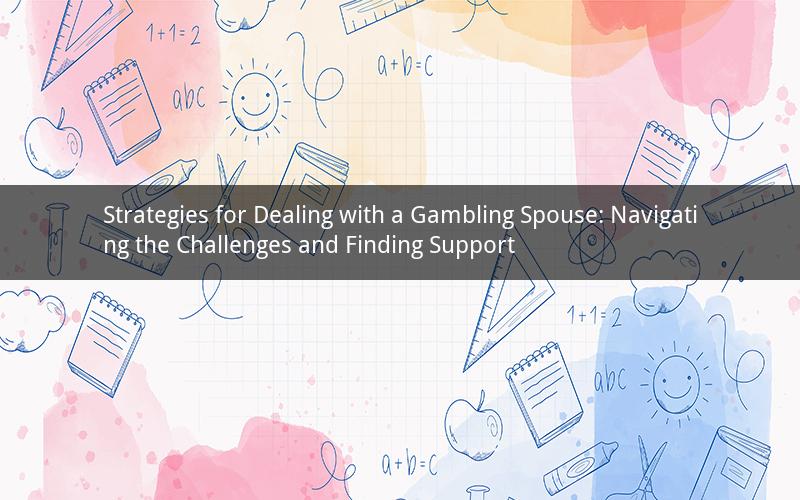
Dealing with a gambling spouse can be incredibly challenging, as it often leads to financial strain, emotional turmoil, and a strained relationship. It's important to approach this situation with understanding and seek appropriate support to navigate through the complexities. In this article, we will explore various strategies to help you deal with a gambling spouse and find the necessary support.
1. Educate Yourself About Problem Gambling
The first step in dealing with a gambling spouse is to educate yourself about problem gambling. Understanding the signs, symptoms, and causes of gambling addiction can help you recognize the severity of the situation and seek appropriate support. It's essential to know that gambling addiction is a chronic condition, and it requires treatment and support to overcome.
2. Communicate Openly and Supportively
Communication is key when dealing with a gambling spouse. Find a calm and appropriate time to discuss your concerns and feelings without placing blame or being confrontational. Use "I" statements to express your emotions and avoid accusatory language. Encourage your spouse to open up about their struggles and be supportive of their efforts to seek help.
3. Set Boundaries and Establish Financial Control
Establishing boundaries is crucial when dealing with a gambling spouse. Set clear limits on financial access and consider seeking professional advice on managing joint finances. It's important to protect yourself and any children from the potential financial consequences of gambling. By taking control of the family's financial situation, you can reduce the stress and strain caused by the addiction.
4. Encourage Professional Help
Encourage your spouse to seek professional help for their gambling addiction. Therapy, counseling, and support groups can provide them with the tools and strategies to overcome their addiction. As a partner, you can also attend therapy sessions to address your own feelings and concerns. Support groups like Gam-Anon can offer you a community of individuals who have faced similar challenges.
5. Seek Support for Yourself
Dealing with a gambling spouse can take a toll on your emotional well-being. It's important to seek support for yourself as well. Consider joining a support group specifically for partners of gamblers, where you can share your experiences, learn coping strategies, and connect with others who understand your situation. You may also benefit from individual therapy to help you process your emotions and develop healthy coping mechanisms.
6. Create a Safe Environment
Create a safe and supportive environment for your family. Encourage open communication and provide a safe space for expressing concerns and feelings. It's essential to address any underlying issues that may have contributed to the gambling addiction, such as stress, financial worries, or other mental health concerns.
7. Be Patient and Understanding
Healing from a gambling addiction is a long process, and it's important to be patient and understanding throughout the journey. Understand that your spouse's addiction is not a reflection of your worth or love. Encourage their efforts to seek help and support them through the challenges they may face.
8. Protect Yourself and Your Family
Protecting yourself and your family from the consequences of gambling addiction is crucial. Establish a financial plan to ensure your family's needs are met, and seek legal advice if necessary. It's essential to create a safety net to minimize the impact of the addiction on your family's well-being.
9. Celebrate Progress
Recognize and celebrate any progress your spouse makes in their journey to overcome their addiction. Positive reinforcement can help maintain motivation and encourage continued efforts to seek help.
10. Continue to Support and Educate Yourself
Even after your spouse has overcome their gambling addiction, it's important to continue supporting them and educating yourself about the topic. Maintain open communication and be available to discuss any concerns or triggers that may arise. By staying informed and supportive, you can help ensure a healthy and fulfilling relationship.
In conclusion, dealing with a gambling spouse can be a challenging and emotional experience. By educating yourself, communicating openly, seeking support, and establishing boundaries, you can navigate through the complexities of this situation. Remember to take care of yourself and seek the necessary support to overcome the challenges you may face.
Questions and Answers:
1. What are the signs of a gambling addiction?
- Signs of a gambling addiction may include hiding gambling activities, lying about gambling habits, borrowing money, spending excessive time and money on gambling, and experiencing mood swings or irritability when not gambling.
2. Can a gambling addiction be cured?
- A gambling addiction is a chronic condition, but it can be managed and overcome with proper treatment and support. It's important to seek professional help to address the addiction and develop healthy coping strategies.
3. How can I support my spouse in overcoming their gambling addiction?
- You can support your spouse by encouraging them to seek professional help, providing a safe and supportive environment, being patient and understanding, and celebrating their progress. It's also essential to take care of yourself and seek support for your own well-being.
4. Can gambling addiction be genetic?
- While gambling addiction is not solely genetic, there may be a genetic predisposition to developing an addiction. Factors such as family history, personality traits, and environmental influences can contribute to the development of a gambling addiction.
5. What should I do if my spouse is not willing to seek help for their gambling addiction?
- If your spouse is not willing to seek help, it's important to establish boundaries for your own well-being and seek support for yourself. Consider involving a professional therapist or counselor who can help you navigate this challenging situation and explore ways to support your spouse while protecting yourself and your family.